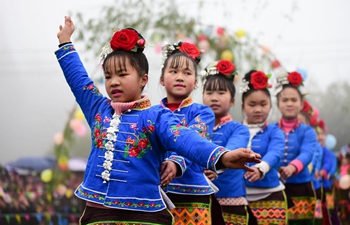GENEVA, Feb. 14 (Xinhua) -- Two UN agencies Thursday called on states and regional organizations to take urgent actions to ensure no child is born, or remains, stateless in Europe.
The UN Refugee Agency, UNHCR, and the UN Children's Agency, UNICEF, said in a joint statement here that there are no precise figures on the total numbers of stateless children.
However, more than half a million people in Europe are estimated to be stateless.
As the overall number of asylum-seeking children in Europe has grown since 2010, with peaks in 2015 and 2016, so has the number of children identified as "stateless", said UNHCR and UNICEF in the statement.
In 2017, some 2,100 children were registered as "stateless", which represented a four-fold increase compared to 2010.
Children without a nationality have limited access to fundamental rights and services such as education and healthcare and can face life-long discrimination.
Lack of official documents can put children at higher risk of experiencing violence, abuse, and trafficking, and place them and their families at risk of arrest and detention.
"Every child has the right to a name and a nationality," said Afshan Khan, UNICEF regional director for Europe and Central Asia.
"Governments not only have a responsibility to adopt safeguards that prevent a child from being born stateless, but to provide legal aid and support to ensure every stateless child realizes their right to citizenship."
The agencies said children who are born stateless in Europe are particularly affected.
These include children who cannot inherit their parents' nationality due to gender discrimination and gaps in nationality laws and those who are stateless because their parents are.
Also affected are children born in Europe whose births are not registered, including children in vulnerable minority populations like the Roma.
Then there are children from countries with known stateless populations who come to Europe as refugees and asylum-seekers who also faced problems said the agencies.
While birth registration rates are high in Europe, information campaigns targeting families most at risk of statelessness would help identify unregistered children and support families through registration procedures.
Achieving legal identity for all through birth registration is one of the goals of the 2030 UN Sustainable Development Agenda.

















